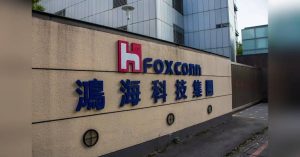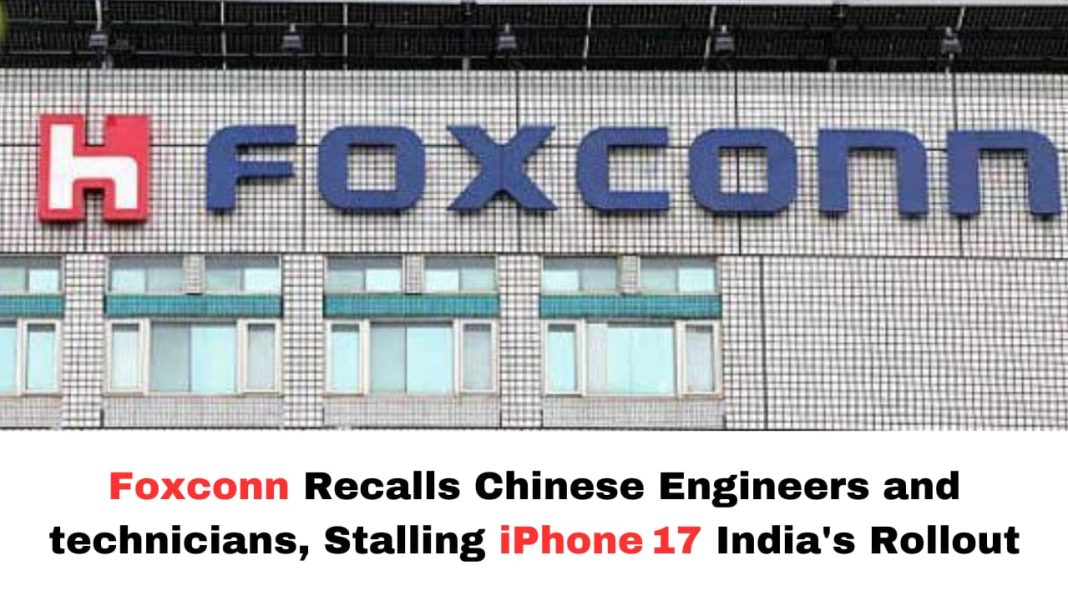Digital News Guru National Desk:
Foxconn’s Pullback from India: A Strategic Setback in Apple’s Expansion
Over the past two months, more than 300 Chinese engineers and technicians were quietly recalled from Foxconn’s iPhone assembly plants in southern India, specifically in Tamil Nadu and Karnataka. Bloomberg first reported that Beijing had “verbally encouraged regulatory bodies and local governments to curb the flow of Chinese talent, equipment and technology to India and Southeast Asia”. The recall left behind only Taiwanese staff, heightening concerns about slowing the ramp-up ahead of the September launch of the iPhone 17 lineup.
The Geopolitical Undercurrents
This move reflects a broader geopolitical play by China, signaling resistance to Apple’s growing “China + One” manufacturing diversification strategy. A Financial Times report outlines how Beijing has begun to restrict movement of engineers and critical machinery to countries like India and Vietnam, aiming to protect its production edge.

These constraints extend beyond manpower; reports from the Financial Express confirm that specialized equipment shipments from China to India have been delayed, further slowing the manufacturing transition.
Operational Consequences in India
Ramp‑Up Disruption
Chinese personnel were essential in training local staff, troubleshooting sophisticated assembly lines, and ensuring smooth, standardized production. Their sudden exit is expected to reduce ramp‑up efficiency during the critical pre-launch phase for iPhone 17.
Supply Chain & Machinery Delays
Foxconn recently issued an import order for $32 million worth of specialized equipment, likely to address earlier disruptions. While this investment signals resilience, delays in machinery arrival may still impact the fully localized production that Foxconn hopes to achieve.
Workforce Expansion Plans
Foxconn is in the midst of ramping up employment—adding tens of thousands of workers and building out large campuses like “Project Elephant” near Devanahalli, Karnataka. The recall could delay critical staff training and reduce production momentum, though Foxconn still plans to grow its workforce to around 50,000–70,000 in India.
Strategic Stakes for Apple
Quality vs. Quantity
Apple assures that product quality won’t be affected, citing strong process standardization. However, introducing new labour without seasoned Chinese mentors could slow production tempo and raise costs.
China + One Complexity
When Trump-era tariffs put pressure on China, Apple initiated supply chain diversification. India now accounts for about 20% of global iPhone assembly—up from near-zero just a few years ago—and targets 25–30% by 2027. The recall challenges how quickly India can scale to meet that goal.
Geopolitical Crosswinds
The US- and China-led pressures frame this as a clear geopolitical chess match. Washington’s tariff posture acts as a carrot, but Beijing’s recall signals a counterbalance, attempting to slow Apple’s expansion .

India’s Manufacturing Landscape
Infrastructure & Ecosystem
India’s electronics ecosystem remains far less mature than China’s, still dependent on imported parts and machinery . This incident exposes the need for targeted support for domestic capacity building.
Workforce and Community Considerations
Foxconn’s growth is reshaping local economies—as seen with factory campuses and “smart cities” near Devanahalli. But this urbanization has triggered land and labour controversies, with farmers protesting inadequate compensation. Societal alignment and political diplomacy remain crucial.
Regulatory & Social Pressures
Foxconn is already under scrutiny: India’s National Human Rights Commission criticized it over discriminatory hiring in Tamil Nadu. A recent suspension of married-women hiring further underscores social risk.
Foxconn & Apple’s Strategic Playbook
Equipment Investments
Despite setbacks, Foxconn has invested $32 million in new manufacturing gear in India—a move seen as a long-term commitment. This may help compensate for the loss of expertise, although adoption will take time.
Talent Substitution & Expansion
Sources note Foxconn is exploring alternate talent pipelines—such as Vietnamese engineers—to fill role gaps. Meanwhile, Taiwanese staff remain on the ground, reinforcing continuity.
Outlook & Implications
Foxconn and Apple face a decisive moment:
- Short-term impacts: iPhone 17’s India output may lag projections. Tariff sensitivities could raise costs, affecting competitive positioning.
- Medium-term pathway: Success will hinge on skill localization, deeper domestic supply-chain development, and mitigating geopolitical headwinds.

- Long-term signal: India remains a global manufacturing contender, but needs to strengthen ecosystem resilience—otherwise, diversification may falter.
Bottom Line
Foxconn’s recall of Chinese engineers and the delayed machinery shipments mark a critical challenge in India’s bid to become Apple’s manufacturing engine. Although Apple emphasizes that quality standards remain intact, ramp-up speed and cost efficiency may suffer. To overcome this strategic disruption, India must accelerate local talent development, build a mature supplier ecosystem, and deftly manage socio-political dynamics in regions like Devanahalli. Ultimately, Apple’s “China + One” pivot hinges not just on factories, but on resilient, self-reliant value chains—beyond infrastructure and into skill, regulation, and diplomacy.
You May Also Read: Hero Vida VX2 electric scooter in India launched at Rs 59,490 with Battery as a Service








